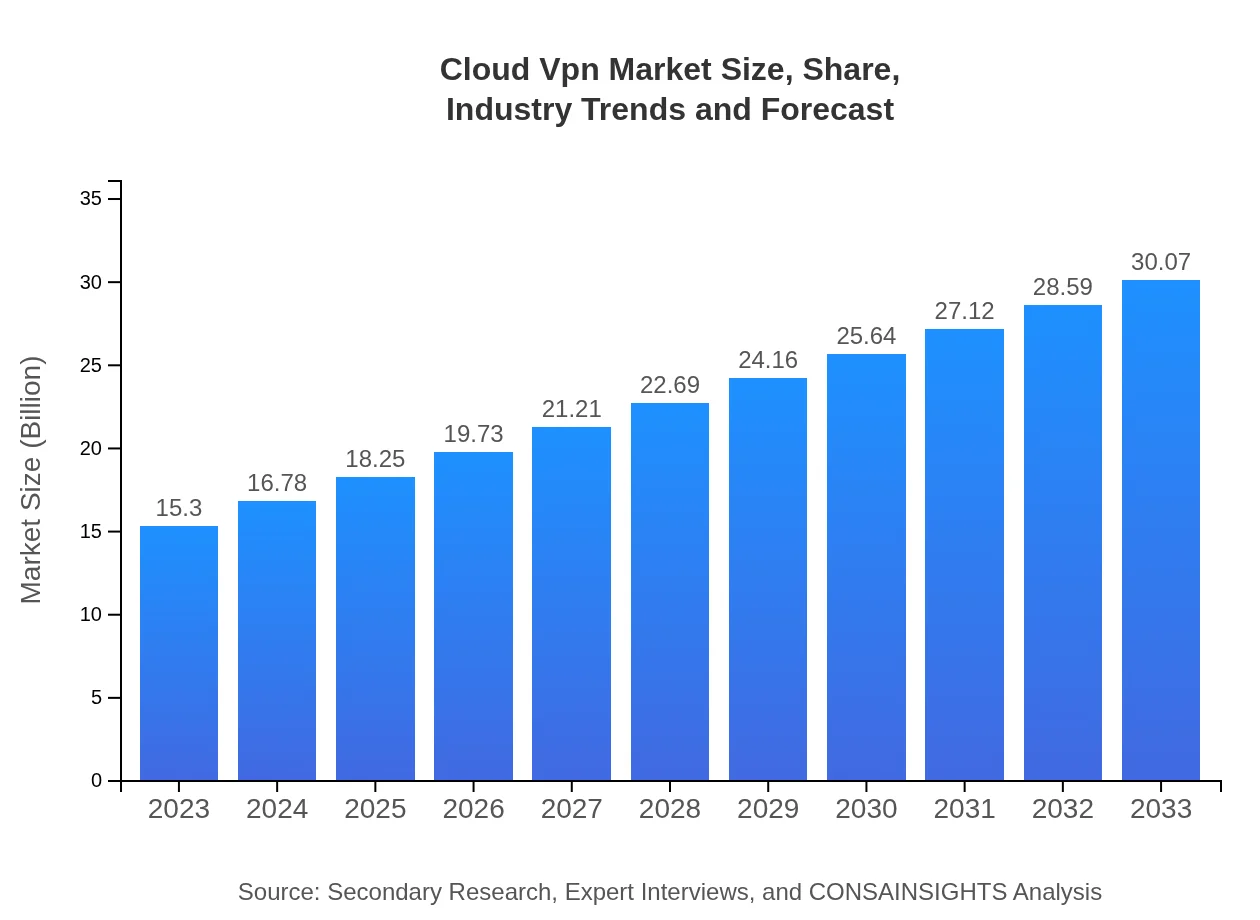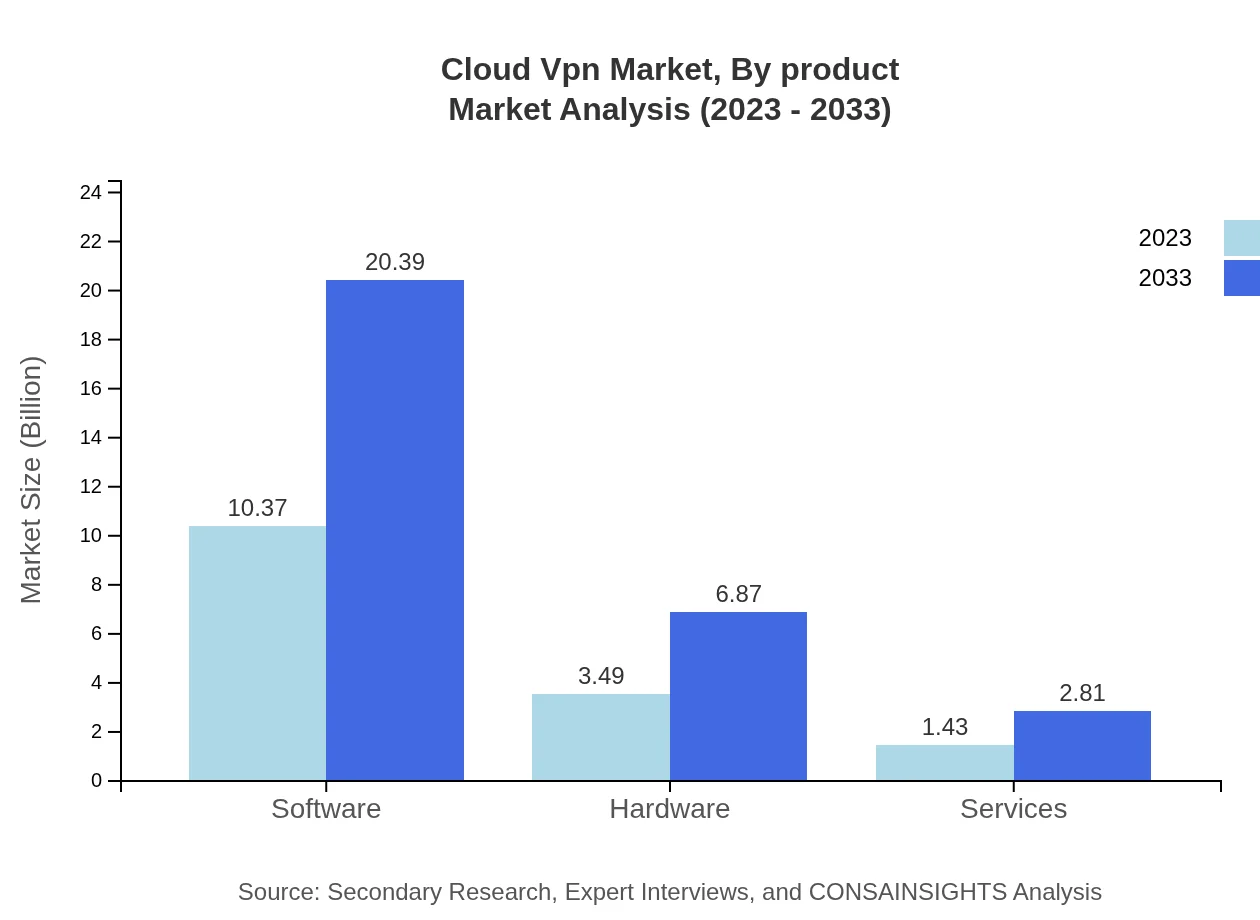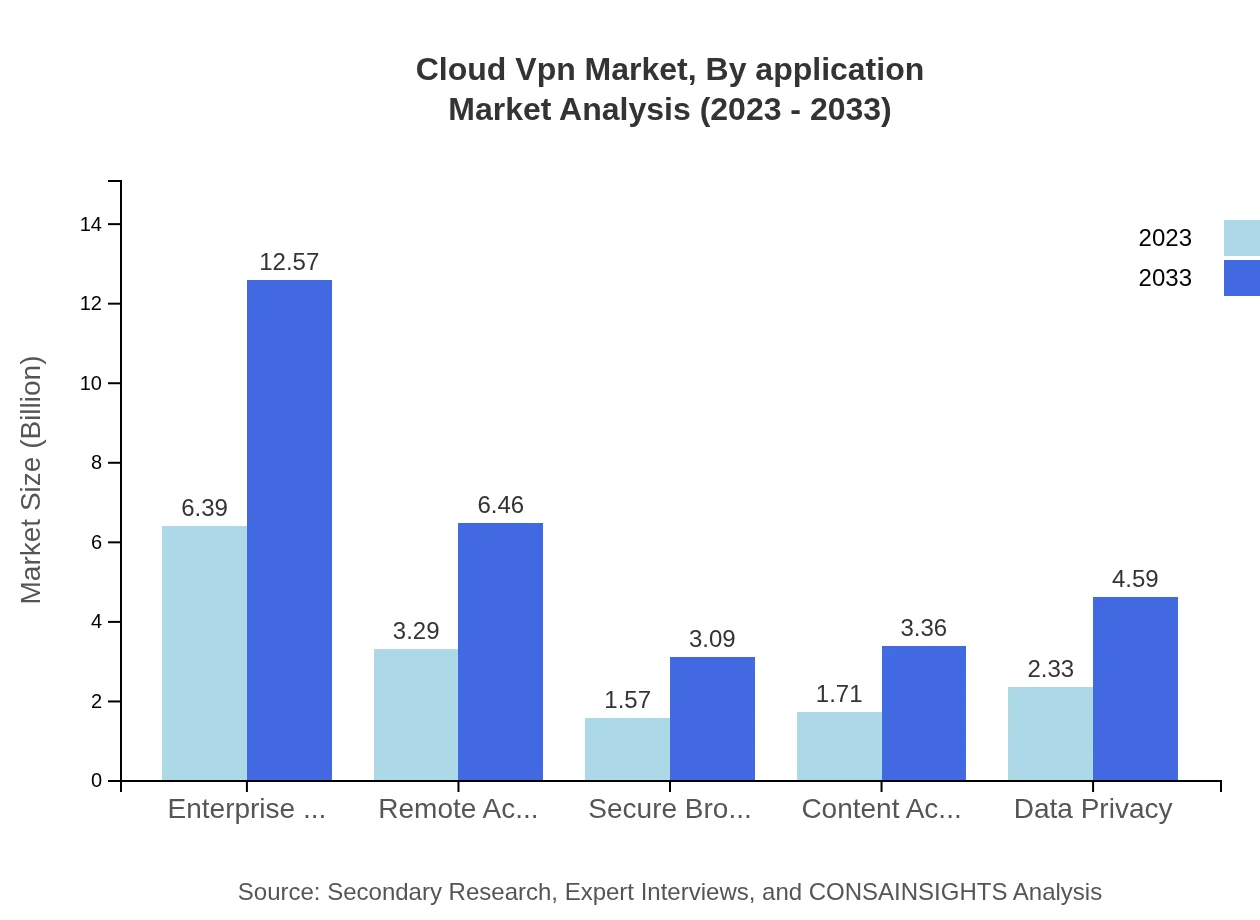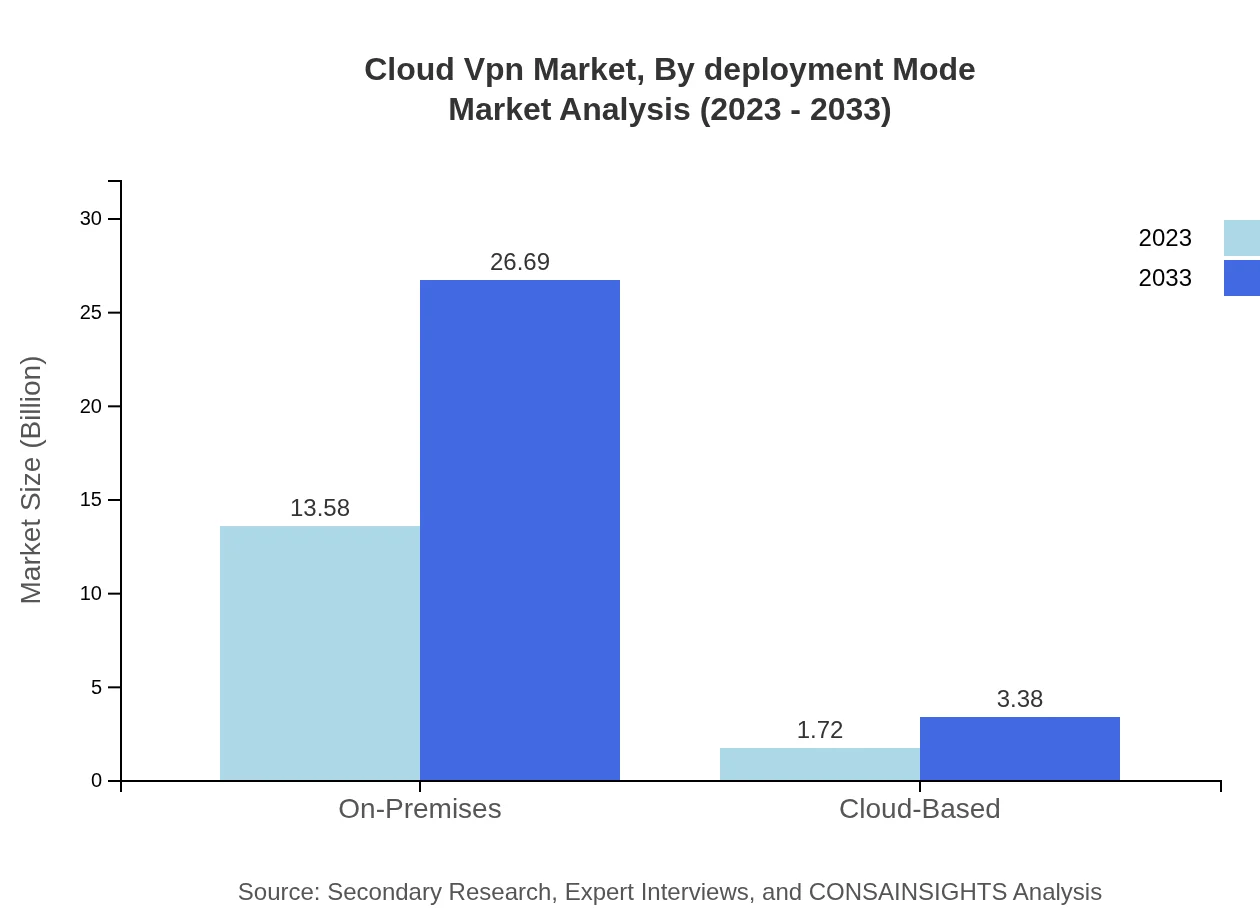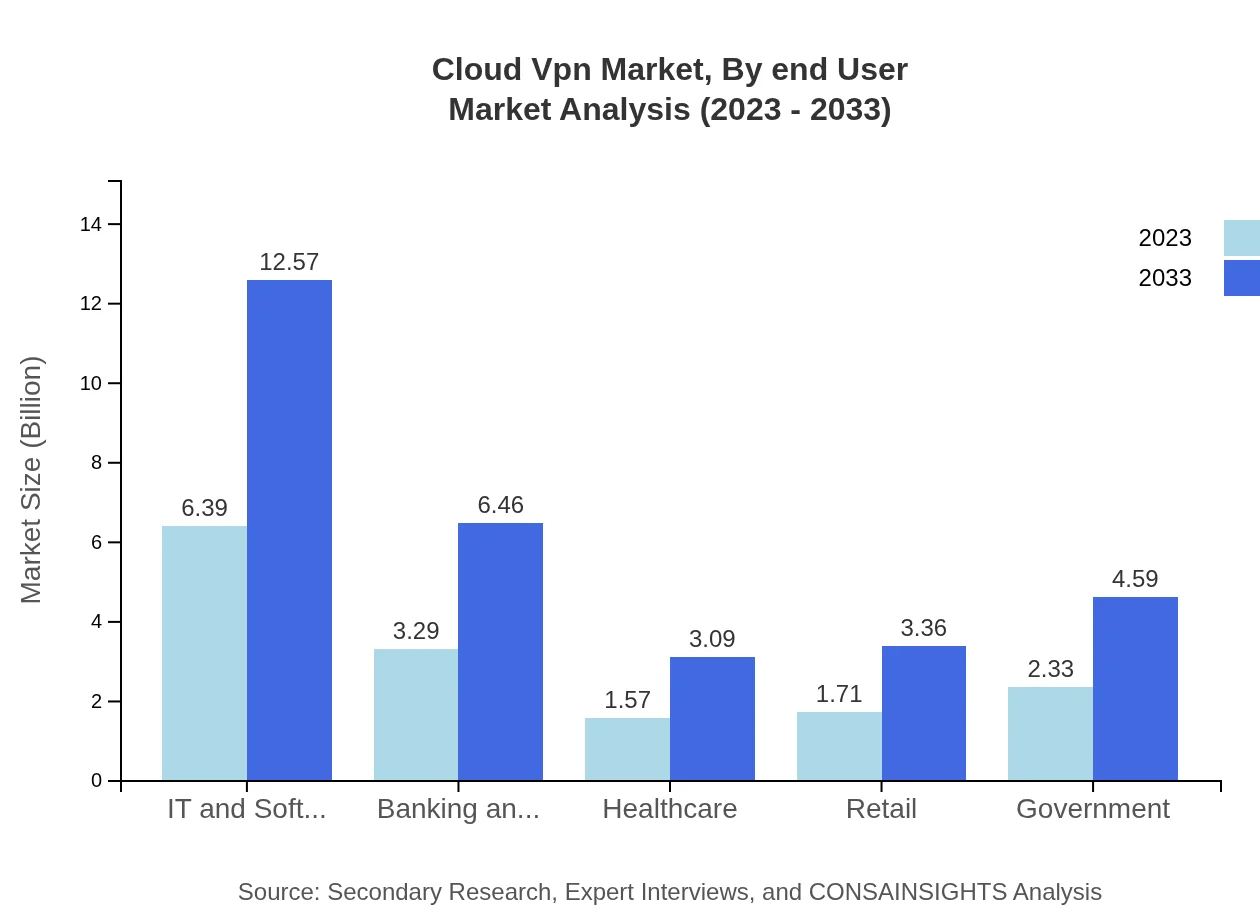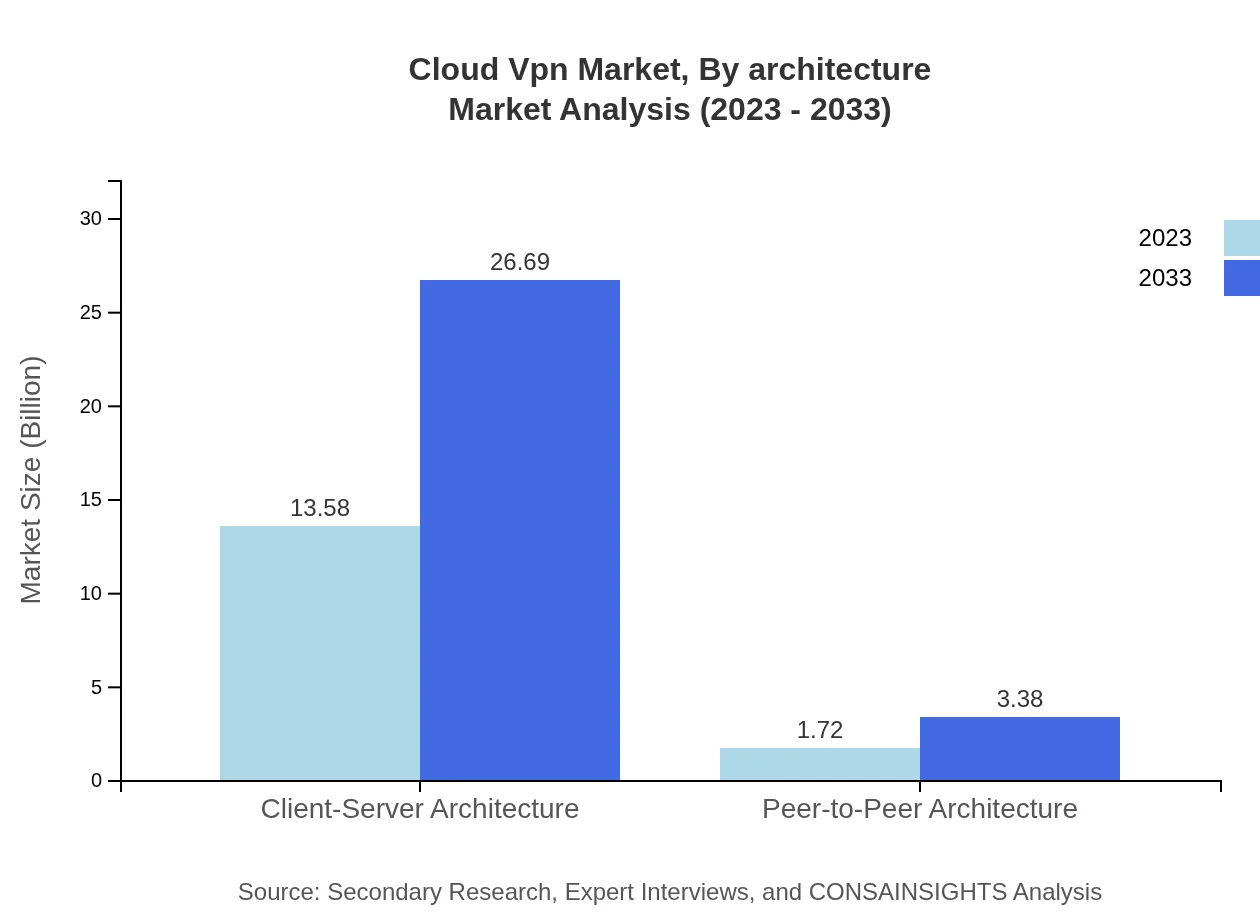Cloud Vpn Market Report
Published Date: 31 January 2026 | Report Code: cloud-vpn
Cloud Vpn Market Size, Share, Industry Trends and Forecast to 2033
This report provides a comprehensive analysis of the Cloud VPN market, covering forecasts from 2023 to 2033, including market trends, segmentation, regional insights, and key industry players, aimed at helping stakeholders understand the evolving landscape.
| Metric | Value |
|---|---|
| Study Period | 2023 - 2033 |
| 2023 Market Size | $15.30 Billion |
| CAGR (2023-2033) | 6.8% |
| 2033 Market Size | $30.07 Billion |
| Top Companies | NordVPN, ExpressVPN, Cisco, Palo Alto Networks |
| Last Modified Date | 31 January 2026 |
Cloud Vpn Market Overview
Customize Cloud Vpn Market Report market research report
- ✔ Get in-depth analysis of Cloud Vpn market size, growth, and forecasts.
- ✔ Understand Cloud Vpn's regional dynamics and industry-specific trends.
- ✔ Identify potential applications, end-user demand, and growth segments in Cloud Vpn
What is the Market Size & CAGR of Cloud Vpn market in 2023?
Cloud Vpn Industry Analysis
Cloud Vpn Market Segmentation and Scope
Tell us your focus area and get a customized research report.
Cloud Vpn Market Analysis Report by Region
Europe Cloud Vpn Market Report:
Europe's market is anticipated to grow from $3.79 billion in 2023 to $7.45 billion in 2033, supported by a strong regulatory framework advocating data privacy and the increasing adoption of remote working policies.Asia Pacific Cloud Vpn Market Report:
In the Asia Pacific region, the market is expected to grow from $3.28 billion in 2023 to $6.44 billion in 2033, driven by increasing internet penetration, a rising number of cyber threats, and the adoption of cloud services in various sectors.North America Cloud Vpn Market Report:
North America holds a significant share of the Cloud VPN market, expected to increase from $5.54 billion in 2023 to $10.88 billion by 2033. High adoption rates of advanced cloud solutions and strict data protection regulations drive this growth.South America Cloud Vpn Market Report:
The South American market is projected to grow from $0.84 billion in 2023 to $1.65 billion in 2033. The growth in this region is supported by increasing investments in IT infrastructure and a growing awareness of the need for secure connectivity solutions.Middle East & Africa Cloud Vpn Market Report:
In the Middle East and Africa, the market will expand from $1.86 billion in 2023 to $3.65 billion in 2033, bolstered by growing digital transformation initiatives and increasing cyber threats.Tell us your focus area and get a customized research report.
Cloud Vpn Market Analysis By Product
The Cloud VPN market is segmented by product type into Software and Hardware. Software accounted for a major share of the market in 2023, valued at $10.37 billion, and is expected to grow to $20.39 billion by 2033. Hardware solutions are also growing, projected to rise from $3.49 billion to $6.87 billion over the same period.
Cloud Vpn Market Analysis By Application
Various applications of Cloud VPN include IT and Software, Banking and Finance, Healthcare, Retail, and Government. The IT and Software segment leads with a market size of $6.39 billion in 2023, projected to reach $12.57 billion by 2033, marking the importance of secure connectivity for business operations.
Cloud Vpn Market Analysis By Deployment Mode
Deployment modes are classified into On-Premises and Cloud-Based solutions. On-Premises holds the larger market share at 88.75%, valued at $13.58 billion in 2023 and expected to grow substantially in the coming decade, while Cloud-Based solutions, though smaller at 11.25%, are also growing rapidly.
Cloud Vpn Market Analysis By End User
End-user industries such as Enterprise Security, Remote Access, and Secure Browsing are crucial. Enterprise Security represents a significant share at 41.79%, growing from $6.39 billion to $12.57 billion between 2023 and 2033.
Cloud Vpn Market Analysis By Architecture
The market is segmented by architecture into Client-Server and Peer-to-Peer models. The Client-Server architecture dominates with an impressive 88.75% market share, while Peer-to-Peer accounts for 11.25%, reflecting varied user preferences and security requirements.
Cloud Vpn Market Trends and Future Forecast
Tell us your focus area and get a customized research report.
Global Market Leaders and Top Companies in Cloud Vpn Industry
NordVPN:
NordVPN is known for its innovative cryptographic tools and user-friendly interface, providing secure internet access for millions worldwide.ExpressVPN:
ExpressVPN focuses on speed and reliability, offering a wide range of server locations globally and robust security features.Cisco:
Cisco's VPN solutions are widely adopted in enterprises, offering scalable and comprehensive secure access technologies.Palo Alto Networks:
Palo Alto Networks is recognized for integrating advanced security features within their VPN solutions, ensuring robust threat protection.We're grateful to work with incredible clients.









FAQs
What is the market size of cloud Vpn?
The global cloud VPN market is currently valued at approximately $15.3 billion and is expected to grow at a CAGR of 6.8% over the next decade, indicating robust expansion in demand and usage across various sectors.
What are the key market players or companies in the cloud Vpn industry?
Key players in the cloud VPN industry include well-established companies such as Cisco, NordVPN, and ExpressVPN, each contributing innovative solutions and services to enhance security and connectivity for users worldwide.
What are the primary factors driving the growth in the cloud Vpn industry?
Growth in the cloud VPN industry is driven by rising cybersecurity threats, increasing remote work adoption, and the need for secure access to cloud services, which incentivizes businesses to invest in robust VPN solutions.
Which region is the fastest Growing in the cloud Vpn?
The fastest-growing region in the cloud VPN market is North America, with market size projected to increase from $5.54 billion in 2023 to $10.88 billion by 2033, showing significant demand for cybersecurity solutions.
Does ConsaInsights provide customized market report data for the cloud Vpn industry?
Yes, ConsaInsights offers customized market report data tailored to specific requirements within the cloud VPN industry, providing insights that cater to unique business needs and market dynamics.
What deliverables can I expect from this cloud Vpn market research project?
Clients can expect comprehensive market research deliverables including detailed reports, segmented analysis by region and product type, market forecasts, and insights into competitive landscapes in the cloud VPN industry.
What are the market trends of cloud Vpn?
Current trends in the cloud VPN market include an increasing focus on mobile security, greater integration with cloud technologies, and heightened regulatory compliance needs, shaping the future of secure connectivity.

